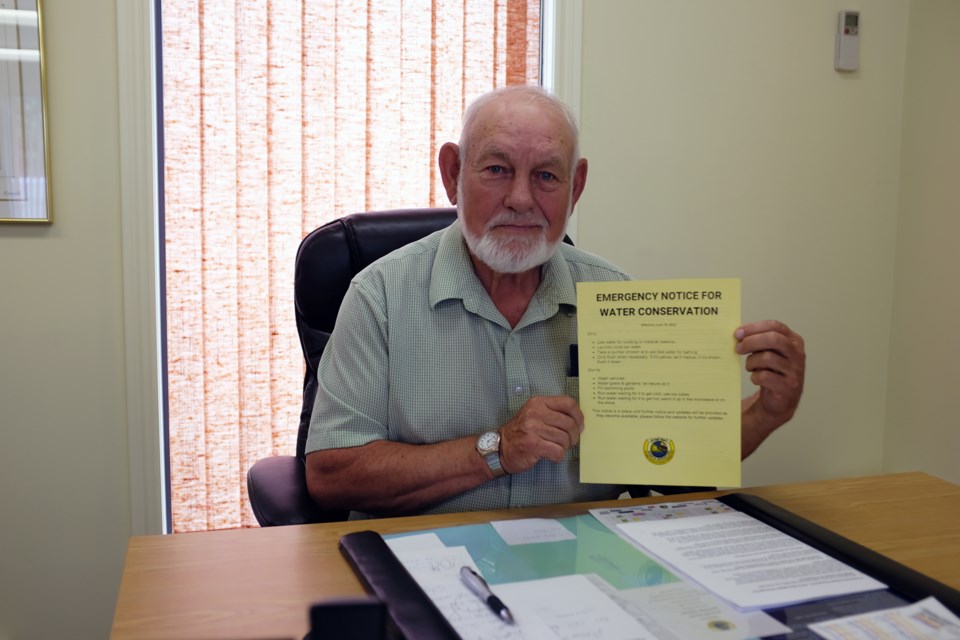Conserving water in the face of last week’s oil spill is a community effort, says Echo Bay mayor Lynn Watson, as water trucks are now hauling safe drinkable water from Sault Ste. Marie.
It has been seven days since a reported 20,000 litres of oil from Algoma Steel's property ended up in the St. Marys River—a high-profile mishap that the company's CEO has called "a very disappointing incident."
Echo Bay draws its water supply from Lake George, which connects to the St. Mary's River upstream from where the spill occurred. The water system is still functioning for the community, but the water intake 30 feet below the surface was shut down shortly after the spill was announced, said Watson.
The mayor declared a state of emergency on Monday.
With only a limited supply of water, Echo Bay is asking residents to conserve wherever possible as more water is trucked in to its holding tanks.
Getting that message out has been a challenge, said deputy mayor Lynn Orchard.
“The most common radio in our area is probably Sirius radio, which is coming from the United States or wherever. Willie Nelson isn’t going to talk about the fact Echo Bay is having a bit of a water problem, but that’s what they listen to,” said Orchard.
Most residents pick up their mail at the local post office, so flyers are being placed in the mail slots of every address asking them to conserve water where they can. It asks people not to water gardens, fill pools or wash vehicles but encourages people to still use it to cook, take shorter showers and flush toilets only when necessary.
The water that is being trucked in from Sault Ste. Marie is drinkable and safe to cook with.
“We want to be more up front, if we can," said Watson. "This tells them what to conserve and what to use."
Because there is no garbage pick-up in the community, flyers are also being distributed at the local dump.
“The community is getting behind our conservation, our water use has dropped by quite a bit — which we need it to," Watson said. "Right now we are on a better field than we were yesterday at this time because people are getting the message."
The water is being brought in using only one truck as of Wednesday. Those trucks need to be certified by the province to carry potable water and Watson said they are not easy to find when you need one.
“It’s something you don’t think of until you need it,” he said.
The cost of gasoline to make the eight to 10 trips a day from the Sault is adding up, so is the cost of using the truck and for the drivers who make the trips.
“We have no idea what the costs are going to be, none whatsoever,” said Watson. “Right now it seems like it’s an open door and we are just doing what we have to do, but eventually we are going to get bills coming out of our yin-yang and they will have to be paid.”
The largest drawer of water in the community is likely the Echo Bay Central Public School, said Watson.
With all of Echo Bay under a state of emergency and residents being asked to conserve water whenever possible, a school spokesperson said it is not being asked to put extra measures in place.
Reached for comment about water conservation efforts at the school, Algoma District School Board communications officer Fran Walsh said she checked in with the school’s principal.
”He shared that the direction from the municipality just a few days ago is to continue daily activities at the school as per usual as the school does have access to fresh, clean water,” said Walsh. “My understanding is the municipality is providing fresh water to the community, including the school. So there have been no extra measures put in place at this time around conserving water at the school.”
“Having said that, the school is being proactive and have additional, portable water coolers in place for students and staff to access, to help reduce demand on the fresh water supply from the township,” she added.
Local restaurateur Marco Bernabucci says he is cutting down on water use at Bucci’s Place in a number of ways. The restaurant moved to an all-takeout format earlier this year, which already cut down on the number of dishes that have to be washed.
“Usually I would be pressure washing the tent and have all kinds of flowers outside that need watering,” said Bernabucci. “Everybody is just trying to do our part.”
The Echo Bay Volunteer Fire Department is also working on ways to reduce its dependence on the limited municipal water supply.
“They had a practice session the other night and, what they did is, go around and mark on their maps where there is water in the ditches that they could use in the event of a fire in different locations,” said Watson.
Orchard said the fire department will not hesitate to hook up to a hydrant and draw on the municipal water supply, if it needs to.
“If something drastic happens in the fire sense, we will use it. We are not going to use it for practice but when it comes to safety we will use it,” he said.
It is not known how long the state of emergency will last. Although Algoma Public Health and the provincial environment ministry continue to test the water supply, the township has yet to be given clearance to restart its water treatment plant.
